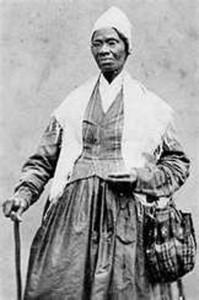Since this month is designated “Women’s History Month” and last month was “Black History Month”, we would like to present a little history about a black woman who was active in the early struggle for women’s rights. If you didn’t learn about her in school, you might enjoy reading the short book written about her, The Narrative of Sojourner Truth: A Northern Slave.
Sojourner Truth was the self-given name, from 1843 onward, of Isabella Baumfree, who was born into slavery in Swartekill, New York in 1797. After escaping to freedom in 1826, she went to court to recover her son from her previous owners, and became the first black woman to win such a case against a white man. On June 1, 1843, she changed her name to Sojourner Truth, and told her friends, “The Spirit calls me, and I must go.” She became a Methodist and left to make her way traveling and preaching about abolition. In 1844, she joined the Northampton Association of Education and Industry in Massachusetts, an abolitionist group that supported women’s rights, religious tolerance and pacifism.
Sojourner Truth started dictating her memoirs to her friend Olive Gilbert, and in 1850 William Lloyd Garrison privately published her book. That same year, she purchased a home in Northampton for $300, and spoke at the first National Women’s Rights Convention in Massachusetts.

Her best known extemporaneous speech on racial inequalities, “Ain’t I A Woman?”, was delivered in 1851 at the Ohio Women’s Rights Convention:
Ain’t I A Woman?
Delivered by Sojourner Truth at the 1851 Women’s Convention in Akron, Ohio
Well, children, where there is so much racket there must be something out of kilter. I think that ‘twixt the negroes of the South and the women at the North, all talking about rights, the white men will be in a fix pretty soon. But what’s all this here talking about?
That man over there says that women need to be helped into carriages, and lifted over ditches, and to have the best place everywhere. Nobody ever helps me into carriages, or over mud puddles, or gives me any best place! And ain’t I a woman? Look at me! Look at my arm! I have ploughed and planted, and gathered into barns, and no man could head me! And ain’t I a woman? I could work as much and eat as much as a man – when I could get it – and bear the lash as well! And ain’t I a woman? I have borne thirteen children, and seen most all sold off to slavery, and when I cried out with my mother’s grief, none but Jesus heard me! And ain’t I a woman?
Then they talk about this thing in the head; what’s this they call it? (member of audience whispers, “intellect”) That’s it, honey. What’s that got to do with women’s rights or negroes’ rights? If my cup won’t hold but a pint, and yours holds a quart, wouldn’t you be mean not to let me have my little half measure full?
Then that little man in black there, he says women can’t have as much rights as men, cause Christ wasn’t a woman! Where did your Christ come from? Where did your Christ come from? From God and a woman! Man had nothing to do with Him.
If the first woman God ever made was strong enough to turn the world upside down all alone, these women together ought to be able to turn it back, and get it right side up again! And now they is asking to do it, the men better let them.
Obliged to you for hearing me, and now old Sojourner ain’t got nothing more to say.
